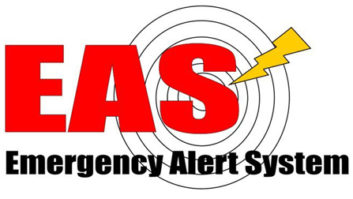
Image: New Jersey Broadcasters Association Even as a big Atlantic storm bears down on their region, Garden State broadcasters are expressing frustration with the state’s emergency alerting.
The New Jersey Broadcasters Association urged their state police and state attorney general’s office to heed its warnings “before a system failure causes harm to anyone in New Jersey.”
The association told members in a newsletter item titled “N.J.’s EAS in Trouble Again” that the state has been “plagued with an ailing, sneezing and wheezing Emergency Alert System for decades.” Broadcasters, it continued, have succeeded in convincing state officials to spend money to improving the system. But it cited two recent incidents that cause continued concern.
“Last month, an unfortunate lighting strike affected a rack of radio equipment including the new EMnet EAS system,” the state association wrote. “The good folks at the [Emergency Operations Center] were aware of problems with some equipment but did not know to what extent systems were affected. The RMT ran into trouble, which was lightening-related (i.e. corrupted files), and the next day (Sept. 19) when they tried sending the RMT again, it failed.”
According to the NJBA, the RMT finally was sent successfully on the morning of Sept. 20.
The association and State Emergency Communications Chairman Rich Archut expressed concerns to state police that anytime a lightning strike happens, affected racks and systems need to be put through a series of checks for damage. They also called for measures to prevent a recurrence, and said that monthly tests present a legal issue for broadcasters. “Further frustrating this month’s RMT was, as a backup, the state tried using the old trunked radio system. That too failed because it had not been tested in months so it was not ready when needed.”
The association said state police “understand and are working on solutions.” It also wrote, “Thankfully, we were not dealing with an AMBER alert or any other serious emergency when the system failed.” But the broadcast organization believes the incident highlights the need for someone to oversee the EMnet system.
It cited another incident on Oct. 5, in which an Amber Alert was sent via the Critical Reach Email system. “No alert was sent over EMnet. In tracking down the reason for this, [NJBA] was told by the Watch Commander on duty at the ROIC [Regional Operations Intelligence Center] that by the time they went to use EMnet (20 minutes later) the alert was cancelled because (thankfully) the child had been found.”
The association feels these issues can be resolved by assigning a part-time or contract person “keeping the importance and use of EAS before the people at the ROIC. This individual could oversee regular training and practice sessions on EMnet for state and county officials and could also keep the EAS plan current for broadcasters.”












